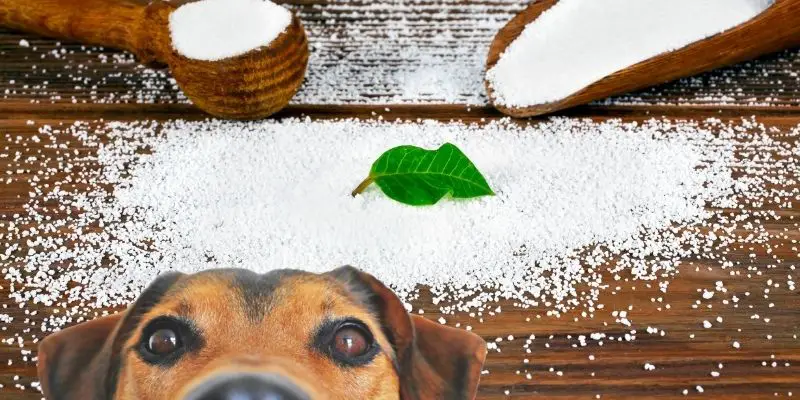Sorbitol is a sugar alcohol that is mostly found in plants and fruits. The compound has diuretic, cathartic and laxative properties.
Most pet owners realize the effects of allowing their pets to consume artificial sweeteners. So “is Sorbitol safe?” is a fair question. This particular sweetener can cause your dog to experience numerous negative side effects. Therefore, you have to be extremely careful when your dog comes into contact with this compound. But let’s jump into details.
Do you have a specific question about dogs and Sorbitol? Then use the table of contents below to jump to the most relevant section. And you can always go back by clicking on the black arrow in the right bottom corner of the page. Also, please note that some of the links in this article may be affiliate links. For more details, check the Disclosure section at the bottom of the page.
Here's what we'll cover:
Is Sorbitol safe?

Despite Sorbitol’s potential side-effects, the compound has been reviewed and recognized to be safe for consumption by various global health authorities, including the FDA, the joint FAO/WHO Expert Committee on Food Additives (JEFCA), and the European Union.
The compound has been found to have very little effect on the body’s blood sugar and insulin levels. However, it has been known to cause digestive distress. While it’s not that toxic to dogs, especially in small amounts, you should avoid feeding your dog with any foods containing this compound. Doing so may affect the dog’s stomach. So, is Sorbitol bad for dogs?

Why is Sorbitol bad for dogs?
Your dog may ingest Sorbitol when you give them an occasional treat. Most treats contain Sorbitol as a substitute for sugar. And although Sorbitol is relatively safe and less likely to cause your dog any significant illness, it may cause minor to moderate stomach upsets.
If eaten in large amounts, Sorbitol and dogs may not go very well together. Especially if your dog has an allergic reaction to the compound.
If any troubling symptoms persist after your dog eats the Sorbitol, you should contact your veterinarian.


Sorbitol side effects in dogs
When used in moderation, Sorbitol for dogs is safe. However, Sorbitol is a sugar alcohol. This means that the compound cannot be broken down in your dog’s body to release sugar and cause a sugar spike.
Since it cannot be broken down, it doesn’t feed any bacteria in your furry friend’s digestive system. Sorbitol is excreted through urine in its most unprocessed form, which causes little harm to your dog, health-wise.
So, what are the potential sorbitol dogs side effects ?
Minor to moderate stomach upsets
People and dogs with IBS, irritable bowel syndrome don’t absorb Sorbitol very well. If your dog is intolerant to Sorbitol, it may experience side effects such as bloating, nausea, abdominal pains, and gas. It would be best if you took it to a veterinarian as soon as possible.
Potential laxative effect
Sorbitol is generally known for its osmotic laxative properties. Apart from the side effects mentioned above, it may also cause diarrhea if consumed in large quantities. Sorbitol may retain water in your dog’s large intestine, which may make your dog’s stool soft. However, if your dog has an underlying condition that predisposes it to diarrhea, then Sorbitol may trigger even worse symptoms.
Pregnant or nursing dogs

In a study carried out on nursing rats, Sorbitol was found to pass through the nursing rat’s milk, and as a result, their offspring showed signs of toxicity such as liver and bone marrow damage and reduced size. Although the studies haven’t been done on dogs, I would advise you not to feed your nursing dog with any products listing Sorbitol as an ingredient, just in case.

How much Sorbitol is toxic for dogs?
How safe is Sorbitol for diabetic dogs, and what is the safe sorbitol dose for dogs?
Sorbitol is safe for diabetic dogs since it is not broken down when digested to release any sugar that may cause a spike in blood sugar levels. This property is what makes the compound safe for diabetic dogs. Studies show that you should not exceed a dosage of 20mg per kilogram per day of Sorbitol for your dog. Exceeding this may trigger toxic side effects from your pet.

Symptoms of sorbitol poisoning in dogs
The symptoms of sorbitol poisoning in dogs include:
- Vomiting
- Diarrhea
- Flatulence
- Agitation

Is Sorbitol the same as Xylitol?
Most people often confuse Sorbitol with Xylitol. The one thing they have in common is that they are both artificial sweeteners.
However, Xylitol is more harmful than Sorbitol (in fact it’s often listed as one of the most dangerous dog foods) and should not be fed to dogs under any circumstance. While Sorbitol is present in most dog and human foods, it’s not that harmful and could be fed to dogs, but you should ensure that your dogs do not consume unhealthy amounts of the compound.

Sorbitol in dog treats

Just like with human foods, Sorbitol is often added to dog food to make it more appealing.
Large amounts of sweeteners and other dangerous foods for dogs may be harmful to your dog because they have a wide range of negative side effects. They could cause health issues like hypoglycemia, allergies, obesity, nervousness, and even kidney and liver problems.

Sorbitol in dogs toothpaste
Your pet’s oral hygiene, much like your own, is very important. Poor oral hygiene can lead to bad breath, gingivitis, and swollen gums. However, while cleaning your pet’s teeth, you have to be aware of your dog’s toothpaste’s chemical properties since your dog does swallow the contents.

Sorbitol acts in part with glycerol to hold the toothpaste together. It’s also a sweetening agent meant to encourage the dog to get oral hygiene. However, the amounts of Sorbitol in a dog’s toothpaste are so minimal that they are not very likely to cause your dog to experience IBS symptoms.
You could try and experiment with your dog with small samples to see whether it experiences any harmful side effects before going ahead with the toothpaste.

Can dogs have Sorbitol after all?

Dogs can consume Sorbitol in small to moderate quantities since it is not expressly toxic for your dog. However, there are a few limitations.
You should ensure that your dog consumes tiny amounts of artificial sweeteners. To do this, you have to ensure that you alone can give them any treats to avoid accidental poisoning.
You should also ensure that your dog doesn’t experience cases of irritable bowel symptoms. If they do, I would advise you to avoid giving them any treats containing any sorbitol since it may aggravate the symptoms.
You should also avoid feeding your dog with any sorbitol artificial sweeteners, especially if they are nursing. At least until further research on the compound’s effects on infant puppies is done.
Thanks for the blog graphics: Canva.com


